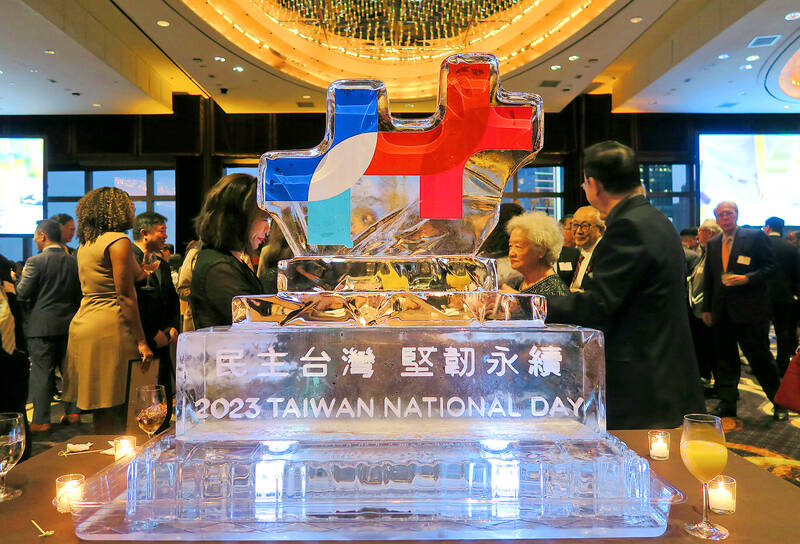The Democratic Progressive Party (DPP) government is using Double Ten National Day to sow ideological division, Chinese Nationalist Party (KMT) lawmakers said yesterday, calling on people to boycott state ceremonies.
KMT legislators Lee De-wei (李德維) and Lai Shyh-bao (賴士葆), as well as Lin Kuo-chun (林國春), who is seeking a legislative seat in New Taipei City, made the appeal at a news conference at the Legislative Yuan in Taipei.
Their remarks came two days after former president Ma Ying-jeou (馬英九) said he would not attend Double Ten National Day ceremonies to protest Taipei’s decision to call them “Taiwan National Day” events in English-language statements.

Photo: CNA
The KMT urges patriotic civil servants and citizens who identify with the Republic of China (ROC) to refrain from taking part in this year’s Double Ten National Day ceremonies held by the Presidential Office, Lee told the news conference.
People should attend events organized by KMT-controlled local governments instead, he said.
The DPP’s move to rename the day was a “shell game to pursue Taiwanese independence,” he added.
The name of the nation is the ROC and should be translated as such in foreign languages, Lai said.
The DPP government’s rebranding efforts are tantamount to “conspiring to declare Taiwanese independence via an act of ... self-conception,” he said.
The DPP at a separate news conference said that the KMT’s attempt to cancel events is itself a divisive act that threatens to “tear apart the nation and its citizens.”
“The KMT caucus’ call is unwise and it is our advice to members of the KMT that they should try to enjoy the celebrations,” DPP secretary-general Chuang Jui-hsiung (莊瑞雄) said.
There is no grounds for KMT complaints, as the ROC national flag would be prominently displayed throughout the Presidential Office-hosted event, Chuang said, adding that the opposition party’s argument is merely a rehash of the dead issue of Taiwan and China being separate countries.
“We are saddened at the remarks [from KMT colleagues], which cheapen the National Day celebrations by making them a tool to win elections,” DPP deputy secretary-general Hung Sun-han (洪申翰) said.
A KMT utilizing ideological radicalization to preserve its electoral fortunes would not be a positive development for the national comity of the ROC, Hung said, adding that the opposition party should “turn back from the abyss.”

CAUTION: Based on intelligence from the nation’s security agencies, MOFA has cautioned Taiwanese travelers about heightened safety risks in China-friendly countries The Ministry of Foreign Affairs (MOFA) yesterday urged Taiwanese to be aware of their safety when traveling abroad, especially in countries that are friendly to China. China in June last year issued 22 guidelines that allow its courts to try in absentia and sentence to death so-called “diehard” Taiwanese independence activists, even though Chinese courts have no jurisdiction in Taiwan. Late last month, a senior Chinese official gave closed-door instructions to state security units to implement the guidelines in countries friendly to China, a government memo and a senior Taiwan security official said, based on information gathered by Taiwan’s intelligence agency. The

Taiwan Semiconductor Manufacturing Co (TSMC), the world’s largest contract chipmaker, said yesterday that it is looking to hire 8,000 people this year, at a time when the tech giant is expanding production capacity to maintain its lead over competitors. To attract talent, TSMC would launch a large-scale recruitment campaign on campuses across Taiwan, where a newly recruited engineer with a master’s degree could expect to receive an average salary of NT$2.2 million (US$60,912), which is much higher than the 2023 national average of NT$709,000 for those in the same category, according to government statistics. TSMC, which accounted for more than 60 percent

The National Immigration Agency (NIA) said yesterday that it will revoke the dependent-based residence permit of a Chinese social media influencer who reportedly “openly advocated for [China’s] unification through military force” with Taiwan. The Chinese national, identified by her surname Liu (劉), will have her residence permit revoked in accordance with Article 14 of the “Measures for the permission of family- based residence, long-term residence and settlement of people from the Mainland Area in the Taiwan Area,” the NIA said in a news release. The agency explained it received reports that Liu made “unifying Taiwan through military force” statements on her online

Tung Tzu-hsien (童子賢), a Taiwanese businessman and deputy convener of the nation’s National Climate Change Committee, said yesterday that “electrical power is national power” and nuclear energy is “very important to Taiwan.” Tung made the remarks, suggesting that his views do not align with the country’s current official policy of phasing out nuclear energy, at a forum organized by the Taiwan People’s Party titled “Challenges and Prospects of Taiwan’s AI Industry and Energy Policy.” “Taiwan is currently pursuing industries with high added- value and is developing vigorously, and this all requires electricity,” said the chairman